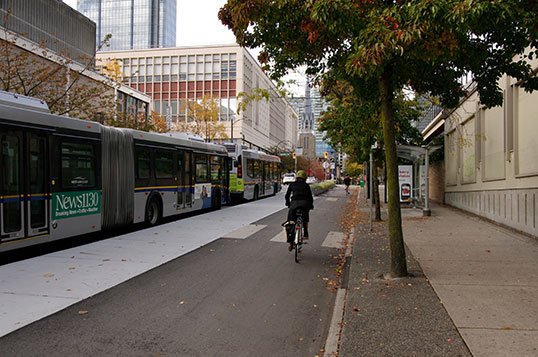July was a record-breaking month in Vancouver — the driest on record. The political discussion in the city during these long, hot summer days was dominated by a most parochial issue: traffic changes from Burrard Street Bridge to Point Grey Road through Kitsilano.
The proposed changes, supported by the Vision Vancouver government at City Hall, represented a modest extension of the city’s network of bike routes and lanes, as well as some traffic re-routing.
The scheme represents a minor inconvenience for some auto commuters, and a minor step towards making our streets safer for cyclists. But it was treated like a major controversy — front page day after day — as things always are when the prerogatives of the well-heeled are infringed upon in the least. Radio talk show hosts asked, ‘has the Mayor gone too far?’ Some over-heated opponents made it sound like Vancouver had become a velo-dictatorship: two wheels good, four wheels bad.
Pushing the hysteria into overdrive was the fact that the new bike lanes coincided with city council’s decision to approve a bike share program for Vancouver, which will see about 1500 bikes available for a small rental or monthly membership fee. The city has been studying bike share initiatives worldwide for years. There are now about 500 cities with such programs; Vancouver’s is mid-scale and long overdue. It’s surprising, given Vancouver’s climate, layout and cycling culture, that such a program hasn’t been rolled out much earlier.
I happened to be in Paris during the summer of 2007, when that city’s Velib bike share program was being introduced. It was fascinating to witness how the 10,000 bikes quickly began to transform the physiology of the ancient city. I’m only surprised Vancouver took so long to arrive at this party.
The reason I say that the great bike debate of 2013 was parochial has to do with what we have learned this summer about climate change. Worldwide there has been an increase in extreme weather events — major floods in both Calgary and Toronto — and the evidence of what some call ‘runaway climate change’ is mounting.
Scientists have long warned that the initial effects of global warming could unleash an unpredictable feedback loop that leads to even more rapid climate change. As the Arctic warms, for instance, huge stores of methane in the region’s permafrost could be released into the atmosphere. One recent study published in Nature magazine puts the price tag of the damage that this ‘Arctic methane bomb’ could produce at $60 trillion. In other words, catastrophic climate change would devastate the global economy. And the real damage can’t be measured in dollars.
Confronting what is now quite evidently a global climate emergency will take a lot more than a few more people riding bikes. It’s heartening that the pro-cycling side won the recent debate in Vancouver, but the changes are totally insufficient. All levels of government need to direct massive public resources into an effort to revolutionize our transportation systems.
In B.C. as a whole, we’re going in the wrong direction altogether. Translink has just announced the cancellation of incentives for lower-income residents to use transit, dropping the Employer pass program and eliminating free rides on Sunday for family members of pass holders.
Local transit authorities need way more funding from both provincial and federal levels of government in order to move in the direction of free transit for all, and every option should be explored for faster, cleaner travel between cities, in order to get people driving less on our crowded highways. Countries all over the globe are building new high speed rail connections, while here in B.C. it’s business as usual, with highway expansion and new billion dollar bridges.
A couple of years ago, the Wilderness Committee and the Canadian Centre for Policy Alternatives co-published a report, Transportation Transformation, that outlines a plan for building a zero-emissions transportation system in B.C. by 2040 (you can read the full report here: stopthepave.org/transformation). It’s a wildly ambitious but doable and necessary project. Adopting such a goal would unleash a wave of innovation, create truly green jobs and make for healthier individuals and healthier communities.
More bikes in the city is a great start, but we need to think much bigger.
A version of this piece was originally published in The Source / La Source, a bilingual Vancouver newspaper where I have a bi-weekly column.
Photo: Paul Kruger / Flickr




